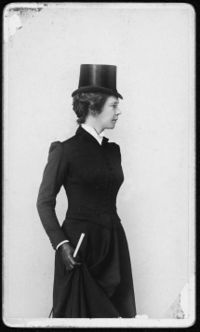Charlotte Barrell (Ware), Phi Chapter, Boston (1862-1945)
Charlotte Barrell (Ware) was Tade Hartsuff’s successor as second Grand President (1884-1888). Tade and her close friend and mentor, Louise Landers (Neff), a charter member of Mu Chapter at Butler, had discussed the strengths and weaknesses of the Fraternity and decided that the next Grand President should offer the “intellectual and social stimulus” of a Kappa from the East.
Charlotte was a senior at Boston University when as Phi’s delegate to the 1884 Convention in Canton, N.Y., she attracted Tade’s attention with her “low and moving voice” in reading a poem. When Charlotte left the Convention, she was a member of three committees and the second Grand President of Kappa Kappa Gamma.
During her first year in the Fraternity’s highest office, she was also Boston University’s junior proctor and senior class president, and president of Gamma Delta, an open society. She was graduated as a Phi Beta Kappa in the spring of 1885.
While Charlotte was Grand President, membership in the Fraternity was restricted to the college level and experimental efforts with Province Conventions began. Her term also saw improved financial standing for The Golden Key.
Most Kappas are acquainted with Charlotte because of the Ware candlesticks. Displayed at Fraternity Headquarters, the silver candlesticks were first used at Charlotte’s wedding to Robert Allison Ware in 1895. She presented them to the Fraternity in 1935 after initiating the Passing of the Light ceremony at Alpha Province Convention, now a beloved Kappa tradition. The century-old candlesticks were used in the closing service at each General Convention and in the installation of new chapters before they were retired in 1998.
Professionally, Charlotte was an internationally-known agricultural pioneer, credited with saving infant life by producing the first certified milk in New England. From 1905 to 1913, she carried on an intensive dairy business at Warelands, her husband’s ancestral 17th century farm in Norfolk, Massachusetts.
Her influence on agriculture was local, national and international. She was instrumental in educating the public on the benefits of milk and in the appointment of the Medical Milk Commission. She organized a dairy school and developed lectures that became university extension courses.
In 1913, she was appointed to a European commission whose report was partly responsible for the creation of federal land banks. In 1922 and 1924, Charlotte was the only woman in an assembly of more than 100 delegates at the International Institute of Agriculture in Rome; she also served as its secretary. During her career, she received numerous awards, including a gold medal from the Belgian government in 1924. When she received a doctor of humanities degree from Boston University in 1937, she was called an “agrarian planner and true servant of humanity.”
In 1930, historian Mary Kingsbury Simkhovitch, Boston, wrote that Charlotte had an “aristocracy of spirit.” Charlotte was a woman of imagination, intellect and organizational skill who wanted her Fraternity to represent the best of everything. Her dramatic presence at the 1930 Convention – during which she held delegates enthralled with travel reminiscences and words on Kappa’s power for good – served as the inspiration for the Ware Cup since retired. In her honor, the Most Outstanding Chapter Award is given at Convention to the chapter that best exemplifies the ideals engraved on the cup.
First bestowed at the 1936 Convention, the Ware Cup’s inscription recognizes Charlotte’s “character and service…in the hope that it may prove a compelling challenge to friendship, selfless service, inspirational living – the Fraternity ideals which her life so radiantly expresses.”
At that same Convention, the Fraternity voted to start a home for Kappa alumnae. At the dedication of the Boyd-Hearthstone in Florida the following year, Charlotte announced she would deed Warelands to the Fraternity for a second Hearthstone. When found unsuitable and a tremendous tax burden, Warelands was sold by the Fraternity in 1948. The proceeds were used to establish the Charlotte Barrell Ware Scholarship Fund, awarded to students for graduate study in international relations, the welfare of women and in agriculture.
